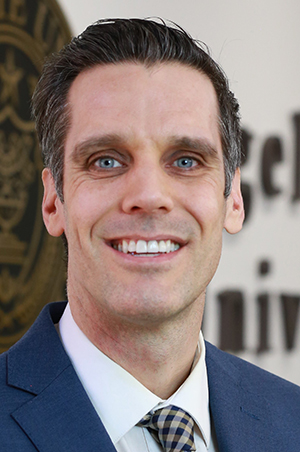Consumers today are feeling the fiscal pinch in the supermarket checkout lines as prices continue to rise. Meanwhile packaging just doesn’t seem to be as full as it once was. According to a paper co-authored by Texas A&M University–Central Texas Visiting Assistant Professor of Business Law Dr. Michael Conklin, this slack-fill practice is not only misleading to the consumer, but also is damaging to the environment, and, Conklin said, slack-fill is becoming a topic of interest in political circles.
“Biden has made the issue a prominent part of his reelection campaign,” he said, pointing out, however, that the current administration’s focus is more about inflation and cost which may not be the best approach to finding a solution.
 Michael Conklin
Michael Conklin“You cannot ultimately ban businesses for increasing prices,” he said. “By instead focusing on the environmental harm from nonfunctional slack-fill, a clear and effective legislative solution is available.”
Conklin said his research paper is the first of its kind to present environmentalism as a basis for this type of regulation.
“Viewing the Package Half Full: The Case for Federal Legislation to Reduce Environmental Harm from Shrinkflation and Slack-Fill Packaging” by Conklin and co-author Chad Marzen, a professor of business law at Pennsylvania State University, is scheduled to be published in the upcoming issue of Georgetown Environmental Law Journal Review. The research looks at slack-fill, the empty space in product packaging, not to be confused with the closely related shrinkflation, the process of giving less product to the consumer for the same price. With either process, consumers get less product without seeing lower prices.
Conklin and Marzen suggest the unused portion of the packaging in the slack-fill scenario results in increased post-consumer waste, and “this waste in turn leads to various types of pollution from landfills,” including the contamination of water supplies and air pollution. Conklin and Marzen also say, “the negative effects are present throughout the consumption process,” as filling packages with less product increases the per-ounce energy expenditure, as well as the per-ounce warehouse space needed for storage that includes refrigeration or freezing for some products.
Along with the energy expenditure, Conklin and Marzen point to increased waste from inefficient combined storage and shipping methods for slack-filled products and the need for increased trips to the store by consumers. The research shows that the additional waste and energy expenditures turn into pollution, contaminating water supplies, and leading to harmful emissions. The resulting air pollution can be linked to climate change.
In all, the authors say the additional waste adds to the United States status as the world’s top per capita producer of waste. Conklin and Marzen point out that the combined issues of additional waste stretch far beyond the U.S. borders with worldwide effects.
“For example, 16.5 million tons of plastic waste wash into the world’s oceans annually,” the authors say. “Such plastic waste remains in the environment for hundreds of years and can kill marine life.”
Conklin and Marzen’s research shows that existing slack-fill legislation does not address environmental issues as the Food and Drug Administration (FDA) is more focused on protecting the consumer from deceptive packaging. The authors propose solving the environmental issues through federal legislation that limits slack-fill to 15% by volume.
Conklin admitted that legislating slack-fill may not be the most pressing political issue, but federal regulations do provide a universally beneficial solution by cutting down on waste, increasing efficiency and limiting pollutants.
“The proposed legislation would ultimately benefit producers, retailers, consumers and the environment,” Conklin said. “With almost all proposed legislation there are trade-offs that must be considered; one group benefits while another is harmed. Our proposed legislation offers a rare win-win opportunity. This could potentially serve as a powerful catalyst for igniting bipartisan agreement on other common sense legislative solutions.”
Conklin’s paper is available for download at: https://papers.ssrn.com/sol3/papers.cfm?abstract_id=4523498
